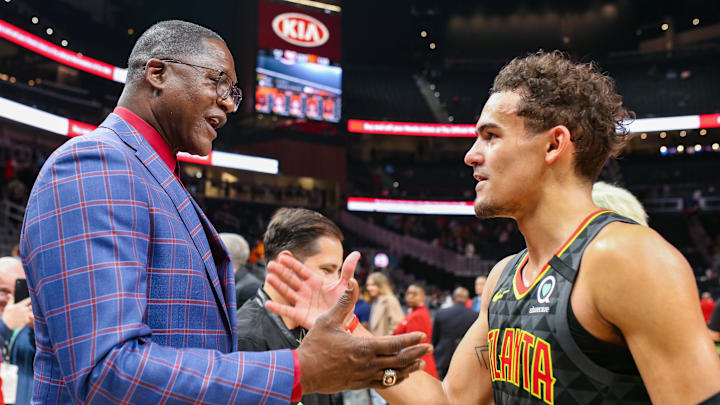At the age of 26, Trae Young is already one of the best players in Atlanta Hawks franchise history, even after only seven seasons in the NBA. For one thing, Young is (by far) the best passer in club history, averaging 9.8 assists and already holding the all-time assist record for the Hawks. On top of that, Young is No. 3 all-time in points per game (25.3), only trailing inner-circle Hall of Fame players, and his impact on the city and the franchise is clear.
Beyond the individual recognition, Young was the best player on the team that made it the furthest in the NBA Playoffs of any Hawks team since the move from St. Louis. While there are certainly questions about the future of Young in Atlanta from a contractual standpoint, the offseason is often a time to take stock and, in this space, we'll do that by stacking Young's current placement in Hawks lore up against the greats.
Don't forget these Hawks
Lou Hudson is No. 3 all-time on the franchise scoring list with more than 16,000 points. He is also in the Hall of Fame after making six All-Star teams, and Hudson's jersey is retired in Atlanta for good reason.
Cliff Hagan is also in the Hall of Fame, and he was the second-best player on an NBA title winner in 1958 when the Hawks were in St. Louis.
Pete Maravich was a one-of-a-kind player that might be higher in Hawks rankings if he spent more than four seasons in Atlanta. On a per-game basis, he was certainly up there, averaging 24.3 points per game with the Hawks and making an All-NBA team.
The semi-recent Hawks stars
Dikembe Mutombo was an easy Hall of Fame choice, and he spent five years in a Hawks uniform during his prime. From a peak perspective, he would be near the top of the list, earning Defensive Player of the Year honors in Atlanta and anchoring 50-win teams. Still, it was only five seasons, and Atlanta isn't the only franchise he's identified with at the highest levels.
Seven-time All-Star Joe Johnson earned the first six of those nods with the Hawks, and he was heavily responsible for pulling the team out of an extended fallow period in the early 2000's. Johnson is No. 7 on the franchise's all-time scoring list and, at the very least, should have his number retired one day.
Five-time All-Star Al Horford could be bound for the Hall of Fame one day, and he played his first nine seasons in Atlanta. While Horford does not have the gaudy counting stats, he was an All-NBA selection in Atlanta, and Horford was the best player on the 2014-15 team that holds the franchise record for regular season wins.
Atlanta's best and an all-time great from the St. Louis days
It would be difficult to argue that Trae Young has joined the conversation with Dominique Wilkins and Bob Pettit. At least not yet.
Young is often (and correctly) referred to as Atlanta's biggest star since Wilkins, but 'Nique is still in a different category of accomplishments at this point. While Wilkins was never able to lead a team to the Conference Finals the way that Young did, he is a Hall of Famer with nine All-Star appearances and seven All-NBA selections. Wilkins was also named to the NBA's 75th Anniversary Team, and he is in the top 20 on the all-time NBA scoring list.
While there are different ways to craft a list, a comprehensive franchise ranking (instead of an Atlanta-focused one) has to have Pettit at the top. Pettit was the best player on the franchise's only NBA championship team in 1958, and he was an 11-time All_NBA selection. In fact, Pettit was named All-NBA in every single season of his NBA career, and he never averaged fewer than 20.4 points or 12.4 rebounds per game in any full season. In short, he was an uber-elite player, and Pettit is currently No. 10 in all-time points per game (26.4) and No. 3 in all-time rebounds per game (16.2). That's an absurd pedestal.
So, where does Trae Young fall?
It could be credibly argued that Young is already the third-best player in franchise history. If he extends his contract and plays a few more years, there is a path for him to at least challenge Wilkins for No. 2 and, if you focus only on Atlanta, the top spot. There is uncertainty there but, at the very least, Young's trajectory could put him in Hall of Fame conversations later in his career, and that is rarified air.
